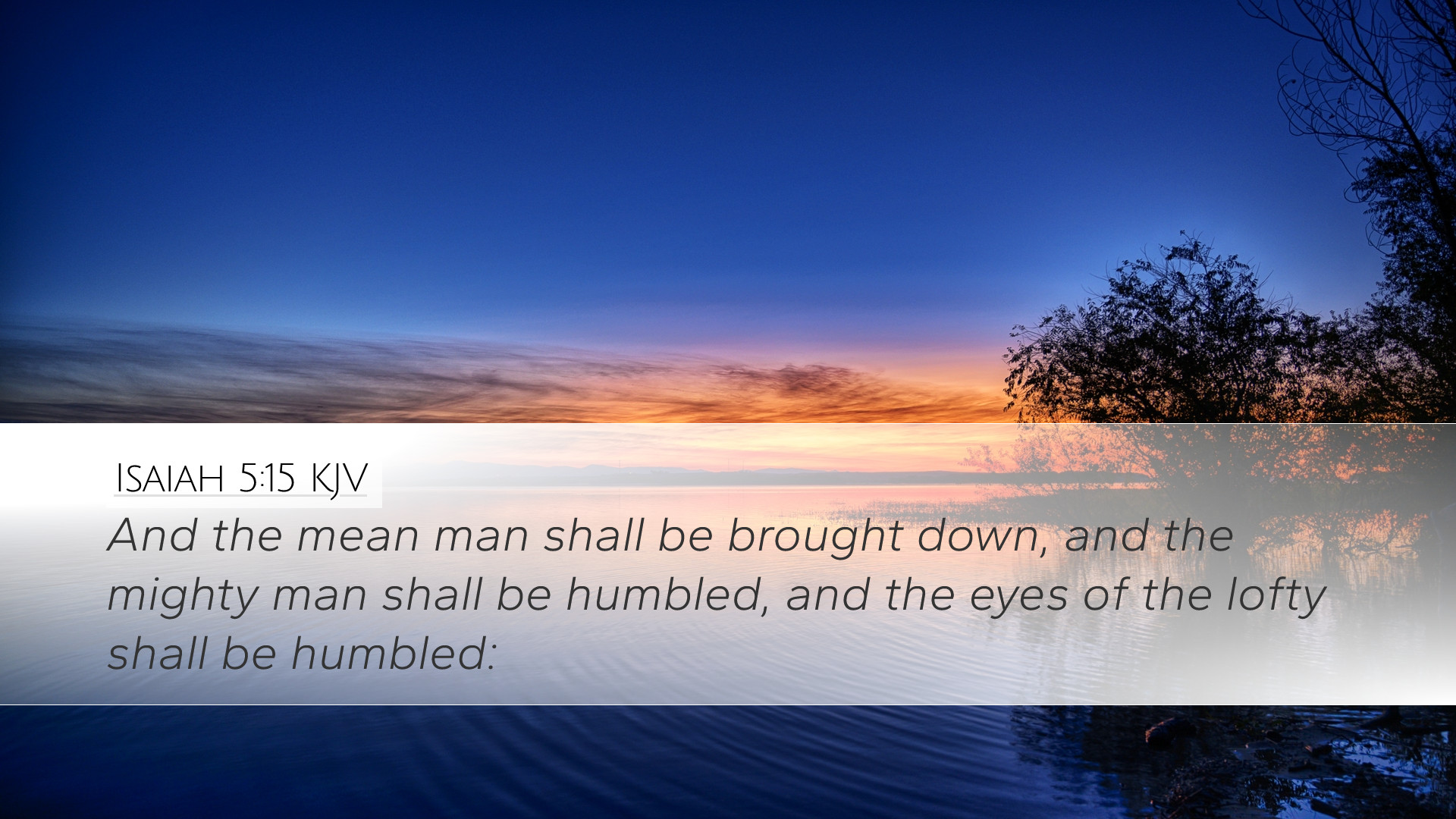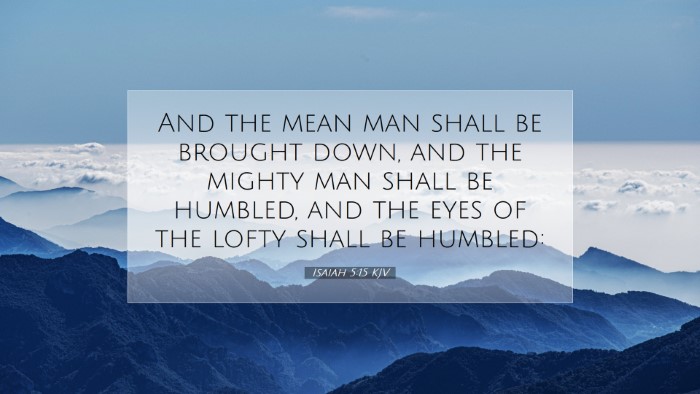Commentary on Isaiah 5:15
Verse: "And the mean man shall be brought down, and the mighty man shall be humbled, and the eyes of the lofty shall be humbled."
Introduction
This verse from Isaiah encapsulates a profound theological and moral lesson about the nature of pride and the inevitable judgment awaiting both the humble and the proud. Its implications resonate throughout Scripture and serve as a reminder of the sovereignty of God in the affairs of humanity.
Contextual Background
Isaiah 5 is part of a larger section in the book of Isaiah that announces judgment against Judah for their sins, primarily their pride and moral decay. By understanding the historical backdrop, readers can delve deeper into the meaning and importance of Isaiah 5:15.
- Pride of Man: The context reveals a society consumed by arrogance, which results in divine judgment.
- Divine Sovereignty: This verse emphasizes that God’s governance extends over all, regardless of human status.
Insights from Public Domain Commentaries
Matthew Henry
Matthew Henry discusses the fate of both the "mean man" and the "mighty man." He asserts that in God's judgment, no status, wealth, or power can shield one from the humbling power of divine justice. Henry notes:
"The proud shall be made low, and the humble shall be exalted. This is a recurring theme throughout Scripture, demonstrating that God's ways are contrary to the ways of men."
He draws a clear dichotomy between earthly status and spiritual standing, indicating that humility before God is essential. Henry also emphasizes that God's judgment is impartial and thorough.
Albert Barnes
Albert Barnes provides additional insight into the social implications of this verse. He points out that the "mean man" signifies the common person, while the "mighty man" represents those in positions of power. He elaborates on their eventual downfall:
"The humbling of the lofty is a clear indication that all human pride and grandeur will come to nothing in the light of God’s judgment."
Barnes highlights the spiritual truth that God uses trials and tribulations to bring individuals to their knees, ultimately calling them to repentance.
Adam Clarke
Adam Clarke offers a detailed exegesis on the Hebrew terms used in this verse, accentuating the depth of the words "brought down" and "humbled." He notes:
"The original language conveys a sense of entire removal from one’s place; it is not merely lowliness but a complete obliteration of pride."
Clarke stresses the idea that this verse serves as a prophetic declaration of the fall of Jerusalem and the people’s enduring rebellion against God. His commentary sheds light on the inevitability of divine judgment as a corrective measure for a wayward society.
Theological Implications
Isaiah 5:15 reflects pivotal theological principles, including:
- The Nature of God’s Justice: God's justice is not partial; He humbles both the powerful and the powerless.
- The Consequence of Pride: Pride is a destructive force that leads to downfall; humility is necessary for divine favor.
- Hope for the Humble: Although this verse speaks of judgment, it leaves room for hope for those who remain humble before God.
Application for Today
In contemporary society, the message of Isaiah 5:15 is strikingly relevant. It calls pastors, students, and theologians to examine their hearts regarding pride:
- Self-Examination: Individuals must assess their attitudes and behaviors for signs of arrogance or superiority over others.
- Community Engagement: Church leaders should foster environments that celebrate humility and service rather than leadership decorated with pride.
- Proclamation of Humility: The Gospel message includes the necessity of repentance and humility before God, a truth pastors must actively preach.
Conclusion
Isaiah 5:15 serves as a potent reminder of the transitory nature of human power and the enduring significance of humility in the sight of the Almighty. Together, the insights from various commentaries elevate our understanding of this scripture, compelling us to reflect on our attitudes toward God and others. Ultimately, in a world that often celebrates pride, the wisdom of Isaiah resounds: true greatness is found in genuine humility and recognition of our dependence on God.


